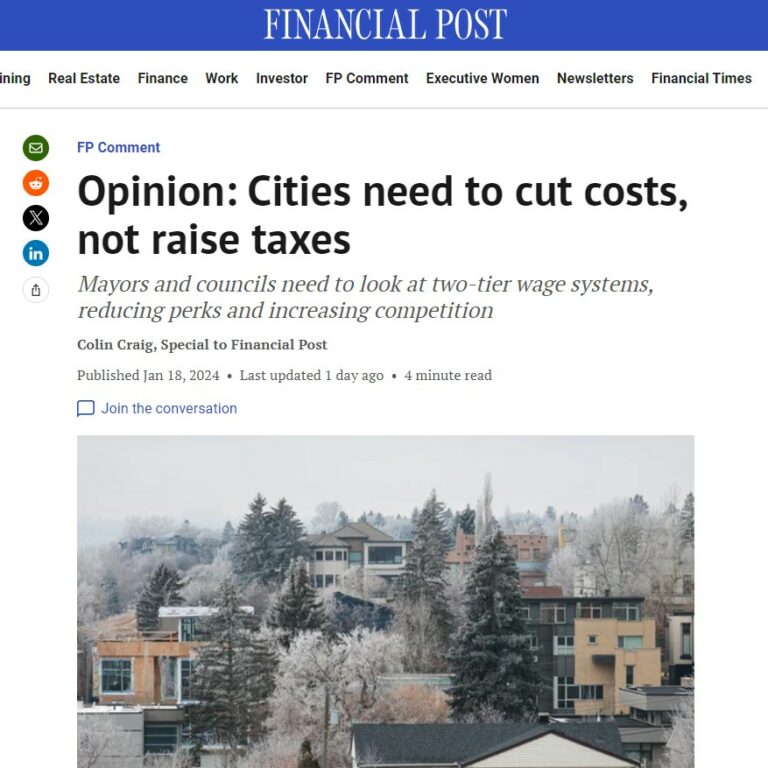Canada is in the middle of an affordability crisis. Grocery bills are way up and food banks are at their limits. Many Canadians are worried about renewing their mortgages at higher interest rates. Some are having to take on second jobs.
FINANCIAL POST COLUMN: Cities Need to Cut Costs, Not Raise Taxes

Mayors and councillors in many large Canadian cities seem not to care. They’ve been imposing steep hikes in property taxes. Having done the math, they seem to have concluded it’s easier to force taxpayers to pay more than it is to make tough spending decisions at city hall.
Toronto, Montreal, Vancouver, Halifax, Edmonton and Calgary have all either approved or are about to approve property tax increases between 4.9 and 10.5 per cent. Politicians on these cities’ councils know your paycheque probably didn’t increase this much. Ho hum! They just don’t seem to care.
Canadians need to know there are plenty of ways to reduce spending and avoid tax increases. And contrary to political dogma, cost savings can happen without cuts in important city services.
Cities could start by addressing the high cost of their labour. It’s well known that government paycheques and benefits are more generous than what’s paid for similar work outside government. Realistically, however, no council is going to cut pay for current employees. Research from SecondStreet.org shows it has been decades since government employees received pay cuts in this country. Government employees are more likely to win the lottery than suffer a pay cut.
What cities could do, however, is phase in lower pay and benefits for new hires. Instead of starting with a salary of $80,000 and a generous pension, clerical workers could earn, say, $73,000 and a more modest pension — defined contribution, not defined benefit. Changes like this could save billions of dollars over the next decade.
Speaking of pensions, a 2019 report by SecondStreet.org found that more than 8,000 city employees in Canada were set to receive multiple pensions upon retirement — generous base pensions plus top-up pension benefits. Calgary had 45 employees who were eligible for three pensions on retirement. (It spent more on double and triple pensions than Edmonton, Toronto, Ottawa, Montreal, Mississauga, Brampton and Halifax combined.)
But it’s not just compensation that deserves a look. While claiming there’s a “climate crisis,” many cities have also been handing out free parking passes to staff. Yes, nothing says “climate crisis” quite like making it easier for people to drive to work. Toronto handed out over 1,267 staff parking passes in 2022 alone. Cities could nix perks like this and rent the parking spaces in question out to the public, bringing in revenue to offset the need for tax increases.
Another revenue-generator is to review city assets and identify land and buildings to sell. For decades Winnipeg sat on 44 acres of riverfront property that was actually located in another municipality. Once that strange arrangement was brought to light, the city sold the land, earning millions to help fund services. Until recently Winnipeg also used valuable land in a booming part of the city for — wait for it — a snow dumping site. Yes, snow is culturally important in Winnipeg but what’s the opportunity cost? Fortunately, the city has since sold the land, which will soon be redeveloped (15 years after a city report first advocated selling it).
Another option is “managed competition,” a tactic Indianapolis pioneered in the 1990s. Instead of just hiring private companies to take over city services like garbage collection and cutting the grass in city parks, Indianapolis encouraged staff who were then doing the work to put in their own bids to try to win contracts and keep doing their jobs. Private companies were often more cost-effective and won but in several instances city employees succeeded.
Pothole repair was one example. City employees won the contract by cutting costs 25 per cent and increasing output 68 per cent. They reorganized patching equipment and shrank their crews from eight workers and two trucks to five workers and one truck.
For decades, clearly, these employees knew how to reduce costs and increase output, but they were never challenged to do so. It wasn’t until their work was subjected to competition that they took action. Overall, the city’s former mayor indicated, managed competition has saved taxpayers over $400 million.
These are just a few examples of how cities could save money instead of imposing large tax increases. But it all starts with councils asking tough questions and making difficult decisions, not taking the path of least resistance and sticking it to taxpayers yet again.
Colin Craig is president of SecondStreet.org, a Canadian think-tank.
This column was originally published in The Financial Post on January 18, 2024.
You can help us continue to research and tell stories about this issue by making a donation or sharing this content with your friends. Be sure to sign up for our updates too!


